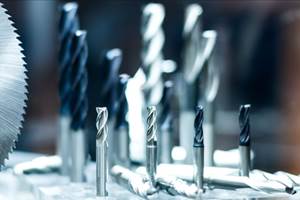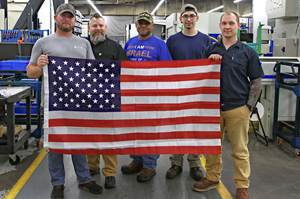Providing the Next Generation with Digital Fabrication Tools and Education
Equipped with machines from Roland DGA, the first 4-H Fab Lab will provide students in Lakeside, Arizona, with a chance to learn manufacturing skills at their own pace.
Share


Hwacheon Machinery America, Inc.
Featured Content
View More
.png;maxWidth=45)
DMG MORI - Cincinnati
Featured Content
View More
Takumi USA
Featured Content
View More
ECi Software Solutions, Inc.
Featured Content
View More


Autodesk, Inc.
Featured Content
View MoreThe Blue Ridge – University of Arizona 4-H Fab Lab hosted its grand opening ceremony January 18 in Lakeside, Arizona. In addition to being the first 4-H Foundation Fab Lab in the United States, it is the first public school Fab Lab established in Arizona.
The facility, located at Blue Ridge High School and funded by the University of Arizona, is designed to train the next generation of STEAM (science, technology, engineering, art and math) professionals through the use of real-world digital fabrication hardware and software.
What Are Fab Labs?
Fab Labs are a project of the Fab Foundation, a group dedicated to providing widespread access to digital fabrication tools and education in their use. It began as an outreach project from the Massachusetts Institute of Technology’s Center for Bits and Atoms, and it has grown into a global nonprofit. By spreading the knowledge and availability of modern fabrication tools, the organization’s goal is to improve lives by enabling people to learn and innovate on their own terms. With the skills gap at the forefront of many conversations about the future of American industry, programs that familiarize learners with the processes of designing and manufacturing are vital. The foundation’s social network of the international Fab Lab community, fablabs.io, claims there are around 1,000 Fab Labs in 40 countries.
The Arizona facility will supply students with free access to an array of digital fabrication machines provided by Roland DGA (Irvine, California). These machines include Roland’s MDX-40A milling machine, LEF-12 flatbed UV 3D printer, SP-300i wide-format printer/cutter and GS-24 desktop vinyl cutter. The company will also supply its Project-Based Learning (PBL) modules, designed to make it easy for students to learn through step-by-step projects. According to the company, its PBL modules have been implemented in K-12 educational programs to enable students to positively engage with manufacturing systems and learn through hands-on activities. Additionally, the company says many technical programs have been using the modules to quickly familiarize students with the machinery, providing them with more time to explore the machine’s capabilities.
Supplying Equipment for STEAM Programs
Roland DGA Product Manager Matt Anderson says that his company offers a variety of easy-to-use devices designed to improve access to manufacturing education. “Roland’s partnership with the Fab Foundation has resulted in these devices being introduced to Fab Labs all over the world,” Mr. Anderson says. “Contributing to the success of Fab Labs is representative of Roland’s wider overall plan to contribute to STEM and STEAM programs around the world.” The company claims its primary educational goal is to expose people of all ages and skill levels to advanced technology, thereby reducing the intimidation people feel when confronted with manufacturing systems.
The Blue Ridge 4-H facility will serve as Arizona’s main 4-H Fab Lab, with smaller “mini-labs” planned in other locations throughout the state. Each facility will utilize the existing 4-H youth development network and programs, which record more than 185,000 student contacts per year in Arizona alone.
“There are 15 Arizona county cooperative extension offices and hundreds of individual clubs throughout the state, each of which can equip their own mini-labs as part of the network and use our flagship lab for added capabilities,” says Kevin Woolridge, the director of the Fab Lab. “Our goal is to have a mini-lab in every Arizona cooperative extension office within the next two years, and in every 4-H community over the next five years. Additionally, we’ll be sharing our program with 110 land-grant universities throughout the country. Having the support from the University of Arizona and technology manufacturers like Roland DGA makes our success possible.” He also mentions that there is the possibility of additional 4-H Fab Labs in other states.
By expanding its educational outreach to 4-H, Roland hopes to take advantage of the organization’s large member base to reach more potential learners across the country. The company has expressed hope that the success of this facility will inspire the creation of similar facilities nationwide.
Related Content
DN Solutions Responds to Labor Shortages, Reshoring, the Automotive Industry and More
At its first in-person DIMF since 2019, DN Solutions showcased a range of new technologies, from automation to machine tools to software. President WJ Kim explains how these products are responses to changes within the company and the manufacturing industry as a whole.
Read MoreAddressing the Manufacturing Labor Shortage Needs to Start Here
Student-run businesses focused on technical training for the trades are taking root across the U.S. Can we — should we — leverage their regional successes into a nationwide platform?
Read MoreWorkholding Fixtures Save Over 4,500 Hours of Labor Annually
All World Machinery Supply designs each fixture to minimize the number of operations, resulting in reduced handling and idle spindle time.
Read MoreFinding Skilled Labor Through Partnerships and Benefits
To combat the skilled labor shortage, this Top Shops honoree turned to partnerships and unique benefits to attract talented workers.
Read MoreRead Next
Registration Now Open for the Precision Machining Technology Show (PMTS) 2025
The precision machining industry’s premier event returns to Cleveland, OH, April 1-3.
Read MoreBuilding Out a Foundation for Student Machinists
Autodesk and Haas have teamed up to produce an introductory course for students that covers the basics of CAD, CAM and CNC while providing them with a portfolio part.
Read More5 Rules of Thumb for Buying CNC Machine Tools
Use these tips to carefully plan your machine tool purchases and to avoid regretting your decision later.
Read More











.png;maxWidth=150)





















.jpg;maxWidth=300;quality=90)














